
Metabolomics is an area of science that focuses on understanding the complex and intricate biochemical processes that occur inside living organisms. Scientists working within metabolomics will analyze various metabolites to see how they interact, learn about their functions, and identify their impacts on the rest of the organisms.
Learning more about metabolomics and physiological processes can help scientists understand more about how living organisms function and respond to changes in the environment. Such research could contribute to better medicine and healthcare for the human population.
Let’s take a deeper look into metabolomics and why it matters in the understanding and management of ongoing health conditions.
What is Metabolomics?
Metabolomics is the scientific study of metabolites. The full set of metabolites within a living organism is called the metabolome, and it encompasses all of the molecules that are produced via various reactions and processes within the cells.
Metabolites include sugars, lipids, amino acids, and nucleotides. The levels of certain metabolites within a cell can inform scientists of the state of that cell and the physiological processes that it is capable of performing.
Scientists may use mass spectrometry (MS) and nuclear magnetic resonance (NMR) spectroscopy to analyze a living organism’s metabolome. They can analyze a variety of biological samples and specimens, such as blood and urine.
Individuals can use metabolic testing kits, such as Iollo, to understand their bodies. Learn about Iollo to understand its key uses, how it works, and whether it’s a good choice for you.
Why Does Metabolomics Matter?
Metabolomics is an important field of study for several reasons.

It enables scientists to gain valuable insights into how living organisms work and discover more about the key roles of different metabolites.
Better Treatments for Diseases
Understanding the functions of metabolites within a living organism can enable scientists to identify biomarkers for diseases and provide better treatments and medicines for these diseases. It also enables scientists to learn more about how diseases work, how metabolites can contribute to or reduce the risk of diseases, and how diet and lifestyle may impact the metabolome.
One of the key uses of metabolomics is to understand the mechanisms of various diseases. The metabolomes of different organisms can be compared to determine whether they influence the health status or disease status of these organisms.
Understanding the Development of Chronic Diseases
Differences in metabolomes may indicate the mechanisms of development for chronic diseases like cardiovascular disease, diabetes, neurological diseases, and even cancers.

Identifying these differences may indicate which metabolites contribute to the development of chronic diseases so pharmacists and researchers can target them when creating new treatments.
Early Diagnosis of Diseases
The study of metabolomics enables healthcare professionals to provide earlier diagnoses of diseases. Metabolites are produced following specific physiological processes, so the presence of certain metabolites can indicate a person’s disease state before any symptoms manifest.
Early detection of diseases can improve patient prognoses and increase survival rates.
Personalized Medicine
Metabolomics can enhance personalized medicine by enabling healthcare professionals to learn more about an individual’s physiological state. Looking at a person’s metabolic profile can provide insights into how they break down certain drugs or nutrients and use them within the body, enabling doctors and nurses to offer more personalized treatments, medications, and lifestyle advice.


